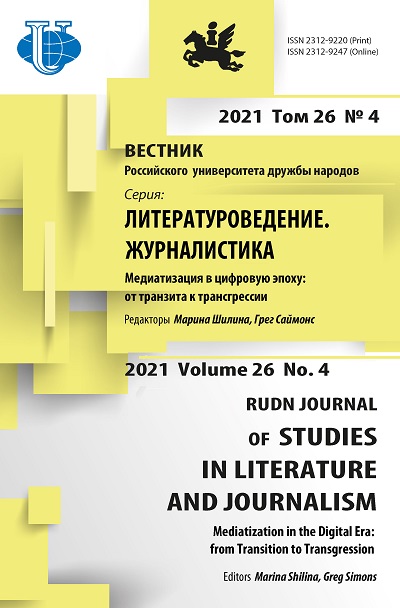Медиатизация телесности и биополитики в киберкультуре
- Авторы: Алексеева Е.А.1
-
Учреждения:
- Государственный академический гуманитарный университет
- Выпуск: Том 26, № 4 (2021): МЕДИАТИЗАЦИЯ В ЦИФРОВУЮ ЭПОХУ: ОТ ТРАНЗИТА К ТРАНСГРЕССИИ
- Страницы: 656-663
- Раздел: Журналистика
- URL: https://journals.rudn.ru/literary-criticism/article/view/29856
- DOI: https://doi.org/10.22363/2312-9220-2021-26-4-656-663
- ID: 29856
Цитировать
Полный текст
Аннотация
В статье анализируются способы биополитического контроля на основе глубокой медиации телесности в киберкультуре. Утверждается, что такая медиатизация является неизбежным процессом из-за всепроникающего взаимодействия между телами, технологиями, медиа и т.п. Таким образом, телесность людей входит в сложную систему различных медиатизированных форм жизни. Рассматриваются две формы глубокой медиатизации телесности в киберкультуре. Выявлены и исследованы ключевые особенности этих форм. Утверждается, что специфика этих форм делает человеческую телесность доступной для биополитического контроля. Продемонстрированы способы медиатизированного биополитического контроля и их опасность. Кроме того, показано, что медиатизированный биополитический контроль иногда ставит людей перед выбором между медиатизацией и смертью. Автор ставит вопрос: неизбежен ли биополитический контроль в связи с глубокой медиатизацией телесности?
Об авторах
Екатерина Алексеевна Алексеева
Государственный академический гуманитарный университет
Автор, ответственный за переписку.
Email: eaalekseeva@gaugn.ru
ORCID iD: 0000-0002-0006-5942
кандидат философских наук, доцент философского факультета
Российская Федерация, 119049, Москва, Мароновский переулок, 26Список литературы
- Gallagher, S. (2006). How the Body Shapes the Mind. Oxford: Oxford University Press.
- Barad, K. (2003). Posthumanist performativity: toward an understanding of how matter comes to matter. Signs, 28(3), 801-831.
- Hepp, A. (2020). Deep Mediatization. Oxfordshire: Routledge.
- Гольман Е. Телесные практики женщин в зеркале феминистской дискуссии // Философско-литературный журнал «Логос». 2018. № 4 (125). С. 129-156.
- Hepp, A., & Krotz, F. (Eds.) (2014). Mediatized Worlds. Culture and Society in a Media Age.
- Фуко М. Нужно защищать общество: курс лекций, прочитанных в Коллеж де Франс в 1975-1976 учебном году. М.: Наука, 2005.
- Агамбен Дж. Homo sacer. Суверенная власть и голая жизнь. М.: Изд-во «Европа», 2011.
- Такер Ю. Три текста о заражении. Пермь: Гиле Пресс, 2020.
- Лаптон Д. Жирные. М.: Изд. дом Высшей школы экономики, 2021.
- Ним Е.Г. Селф-трекинг как практика квантификации телесности: концептуальные контуры // Антропологический форум. 2018. № 38. С. 171-192.
- Sharon, T., & Zandbergen, D. (2017). From data fetishism to quantifying selves: Self-tracking practices and the other values of data. In New Media & Society, 19(11), 1695-1709.
- Пресьядо П. Биополитика в фармакопорнографическую эпоху. URL: https://center forpoliticsanalysis.ru/position/read/id/biopolitika-v-farmakopornograficheskuju-epohu
- Митрофанова А. Киборг как код новой онтологии. Политические и эпистемологические аспекты гибридных тел // Философско-литературный журнал «Логос». 2018. № 4 (125). С. 109-128.
Дополнительные файлы















